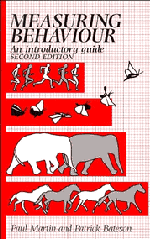Book contents
- Frontmatter
- Contents
- Preface to first edition
- Preface to second edition
- Summary: the steps involved in measuring behaviour
- 1 Introduction
- 2 General issues
- 3 Research design
- 4 Preliminaries to measurement
- 5 Measures of behaviour
- 6 Recording methods
- 7 The recording medium
- 8 The reliability and validity of measures
- 9 Analysis and interpretation of data
- Appendices
- 1 Guidelines for the use of animals in research
- 2 SI units of measurement
- 3 Summary of questions commonly asked in statistical analysis
- 4 A miniature electronic beeper for time sampling
- Annotated bibliography
- Index
1 - Guidelines for the use of animals in research
Published online by Cambridge University Press: 05 June 2012
- Frontmatter
- Contents
- Preface to first edition
- Preface to second edition
- Summary: the steps involved in measuring behaviour
- 1 Introduction
- 2 General issues
- 3 Research design
- 4 Preliminaries to measurement
- 5 Measures of behaviour
- 6 Recording methods
- 7 The recording medium
- 8 The reliability and validity of measures
- 9 Analysis and interpretation of data
- Appendices
- 1 Guidelines for the use of animals in research
- 2 SI units of measurement
- 3 Summary of questions commonly asked in statistical analysis
- 4 A miniature electronic beeper for time sampling
- Annotated bibliography
- Index
Summary
Copied from Animal Behaviour, 43, 185–188 (1992).
The use of animals in research raises important ethical issues. Studies in laboratory settings necessarily involve keeping animals in cages. Manipulative procedures and surgery may be necessary to achieve the aims of the research. Observation of free-living animals in their natural habitats may involve disruption, particularly if feeding, capture or marking is involved. While the furthering of scientific knowledge is a proper aim, and may itself advance an awareness of human responsibility towards animal life, the investigator should always weigh any potential gain in knowledge against the adverse consequences for the animals used as subjects, and also for other animals in the case of field studies.
In order to help their members make what are sometimes difficult ethical judgements, the Association for the Study of Animal Behaviour and the Animal Behavior Society have formed Ethical and Animal Care committees, respectively. These committees jointly produced the following guidelines for the use of all those who are planning and conducting studies of animal behaviour. These guidelines will be used by the Editors of Animal Behaviour. Submitted papers that appear to violate the spirit of the guidelines will be referred to one of the committees, and the evaluation of the committee will be used by the Editor in deciding whether to accept the manuscript.
- Type
- Chapter
- Information
- Measuring BehaviourAn Introductory Guide, pp. 161 - 167Publisher: Cambridge University PressPrint publication year: 1993



